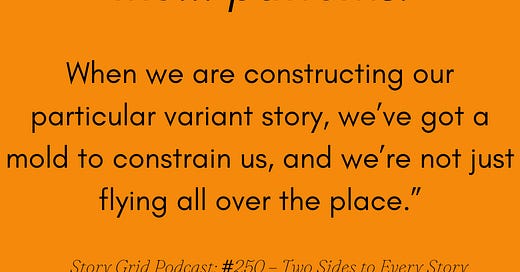Removing the Arena
I don’t have a creative writing degree. I don’t have an MFA, nor do I have plans to go earn one. Sounds like the worst hell. Graded for my opinions and personal thoughts? Facing literary snobbery when I aim to write genre fiction? Nah. I had enough ‘correct, but not the most correct answer’ nonsense in nursing school.
(Yes, that is actually how NCLEX tests are structured. All four options are correct. You must pick the best correct answer.)
Nevertheless, I still want to improve my craft, so I read, and listen, and ask questions.
This past week I was listening to the Story Grid podcast. I recently found this website and started poking around. They have lots of content, the podcast, plus paid options to help you improve your writing, both fiction and nonfiction.
Most of the podcast episodes are short (I listen on 1.25 or 1.5 speed while I commute) and have clearly defined topics that follow a theme.
Episode 250: Two Sides to Every Story, was an interesting one. Kimberly Kessler and Shawn Coyne discuss the ways we as authors must dissect our narratives to discover character motivation and reaction.
“All the great stories have these amazing moments of pure frame obliteration and disintegration, such that the protagonist avatar falls into chaos in such a way that they lose their grip, and they have an existential crisis. Everything that I’ve believed to be true from my past is proven to be wrong.”
Coyne called this the ‘arena.’ When a character is in their arena, doing what they are meant to do, when they are meant to do it, there is no conflict. No story.
But when that character is forced out of their arena, either by their own choices or by the acts of others, this is when we see the real depth to a narrative. If the character follows a simple ‘top-down processing’ schema, just doing what is expected and nothing more, the story will be flat.
‘Bottom-up processing’ is illogical, emotional, keen to the novel and the absurd. It wrecks the carefully ordered life of the characters and makes them face their impulses and desires. This is the good stuff.
“It’s not about formulas. It’s about finding the invariant thematic patterns of sapiential life so that when we are constructing our particular variant story, we’ve got a mold to constrain us, and we’re not just flying all over the place.”
Tropes!! It’s all about the tropes! The thematic structure underlying all stories, be they fantasy, sci-fi, romance, coming-of-age. Every story has a structure underneath, something to lay your fabric over to show the shape of the narrative.
And this is where I like to play.
I ask myself: what formal structures within the genre can I bend? What norms can I turn around, what framework can I put in place that forces something new to come out at the end?
In my book, Archer 887, this was the seed: what tropes can I change? I started with the premise that I would write a science fiction story that didn’t rely on lasers, ‘hyper-drive,’ or any sort of artificial communication technology.
Now comes the conflict. My MC is torn from his arena, both emotionally, mentally, and physically. He plunges into a world he doesn’t understand, grapples with the ramifications of his choices, and faces a threat he never imagined possible.
See all that juicy, juicy, plot?
Now, not everyone appreciated my efforts. But, I am pleased with it. It also raised a lot of questions that I had to grapple with myself. How do they get from planet to planet? What technologies do they have and how do these affect their culture, their morals and ethics? How do they view outsiders and dissidents?
What to find out? Vanguard is in the works. Nearly finished with my first draft; just need to figure out how to kill this character and make it as heart-rending as possible. I saved my red-shirt in Archer. They won’t be so lucky this time. (chuckles manically)
You can buy my book, Archer 887, which was a 2022 Indies Today Awards Contest Finalist. Pick up a copy, leave a review, and let me know what you think!



